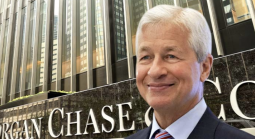Lobbyist Abramoff Charged in Cryptocurrency Fraud Case
SAN FRANCISCO (AP) — Jack Abramoff, a once-powerful lobbyist who spent time in federal prison for fraud and corruption, has been charged in a San Francisco court in an investor fraud case involving cryptocurrency and lobbying disclosure, federal authorities announced Thursday.
U.S. Attorney David Anderson said Abramoff, 61, of Silver Spring, Maryland, has agreed to plead guilty to criminal conspiracy charges and a criminal violation of the Lobbying Disclosure Act in the case involving a cryptocurrency called AML BitCoin.
Anderson said the charges were the first brought since Congress in 2007 amended the act to address lobbying abuses and undisclosed influence that came to light during the early 2000s lobbying scandal involving Abramoff.
Abramoff pleaded guilty in 2006 to a wide-ranging influence peddling probe that involved Capitol Hill, the Interior Department and members of President George W. Bush’s administration. He was convicted of conspiracy, mail fraud and tax evasion and served nearly four years in prison. He was released in 2010.
Prosecutors said in 2017 Abramoff lobbied members of Congress on behalf of a California-based marijuana industry client without registering as a lobbyist.
“Abramoff was aware of the obligations to register as a lobbyist in part because Congress amended provisions of the Lobbying Disclosure Act in 2007 in part as a reaction to Abramoff’s past conduct as a lobbyist,” court documents say.
The investor fraud charges stem from a separate lawsuit filed by the U.S. Securities and Exchange Commission, which claimed Abramoff and an associate, Roland Marcus Andrade, made false claims when they promoted AML BitCoin.
Andrade, 42, of Missouri City, Texas, was charged with fraud and money laundering in an indictment that was returned by the grand jury on June 20 and unsealed Thursday, Anderson said.
He said Abramoff has agreed to plead guilty and could face up to five years in prison. Anderson said Andrade is pleading not guilty.
Abramoff and Andrade could not immediately be reached for comment.
Andrade said his cryptocurrency called AML BitCoin used technologies that complied with the federal government’s anti-money laundering laws and announced an initial offering of AML BitCoin in the amount of $100 million, federal officials said.
In July 2017, Andrade and his company NAC Foundation began selling AML BitCoin and raised at least $5 million through the end of 2018, prosecutors said.
“As alleged today, AML BitCoin did not have the features claimed by the defendants,” said John Bennett, special agent in charge of the San Francisco Division of the Federal Bureau of Investigations.
Abramoff and Andrade are accused of making a series of false statements to potential investors about AML BitCoin, including that the government of Panama and the Panama Canal Authority were in talks to adopt the cryptocurrency for canal transit payments, officials said
They also engineered a publicity stunt by saying that a Super Bowl ad touting AML BitCoin as non-hackable had been rejected by the National Football League on the grounds that it was too politically controversial, the officials said.
“In truth, the defendants never intended to air the Super Bowl ad. The defendants used paid editorials, social media and press releases in an effort to create a false controversy and generate unearned publicity,” Bennett said.















